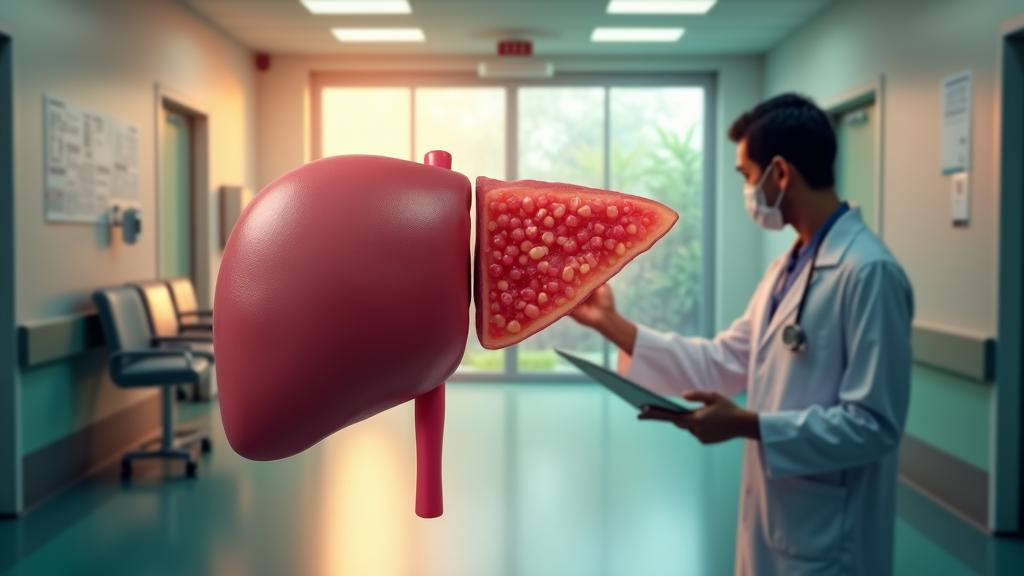Liver cirrhosis is a serious condition where the liver becomes scarred over time. This scarring can be due to various reasons like excessive alcohol consumption or infections. As scarring increases, the liver’s functionality declines.
Raising awareness about this condition is vital, especially in countries like India, where the consumption of alcohol and the prevalence of hepatitis are significant. Early detection is crucial for better liver cirrhosis prognosis; many efforts aim to educate people about recognizing early signs. Knowing what you’re dealing with can give you a fighting chance. Being proactive with health checks can save lives.
Recognizing Liver Cirrhosis Symptoms
Identifying the early stages of liver cirrhosis can be tricky, as initial signals might be subtle. Some early cues include: – Feeling tired more than usual – Losing your appetite – Unintended weight loss
As liver cirrhosis progresses, more evident symptoms might appear, such as: – Yellowing of the skin and eyes, known as jaundice – Swelling in the legs and abdomen – Confusion or forgetfulness, medically referred to as hepatic encephalopathy
Recognizing these signs early is crucial. If you notice any of these symptoms or feel something is off, it’s important to see a doctor. Timely consultations can make a huge difference. Early liver cirrhosis diagnosis offers a better outlook and more effective management strategies.
Causes of Liver Cirrhosis
The primary causes of liver cirrhosis include long-term alcohol consumption and specific infections. In many cases, it’s those who regularly consume alcohol who are at risk. In India, alcohol-related liver cirrhosis affects thousands each year.
Then there’s viral hepatitis, particularly types B and C. These viruses directly harm the liver, making it vital to manage them promptly. Statistics in India show a significant number of hepatitis B and C cases each year, highlighting the importance of prevention and vaccination.
Non-Alcoholic Fatty Liver Disease (NAFLD) ties into lifestyle choices—over-consuming processed foods and not being active enough can lead to this condition. Other factors might include: – Genetic issues – Long-term use of certain medications
Considering these factors highlights how lifestyle changes can reduce risk. Remember, awareness is key. Knowing the causes of liver cirrhosis helps in prevention and management.
Exploring Liver Cirrhosis Treatment Options
Once liver cirrhosis is diagnosed, treatments aim to manage symptoms and halt further damage. Common liver cirrhosis treatment options include:
- Medications: These help reduce liver damage, depending on the cirrhosis cause. For instance, antiviral medications can treat viral hepatitis.
- Lifestyle Changes: Reducing alcohol intake and following a healthy diet is crucial.
- Liver Transplants: For severe cases, when the liver is critically damaged, transplants can be considered.
Additionally, some explore alternative therapies alongside conventional ones. Options like these can be beneficial: – Ayurveda and homeopathy offer herbal treatments – Yoga and meditation provide relaxation and stress relief
Support from groups and counseling can be invaluable, offering encouragement from others facing the same challenges.
Preventive Measures for Liver Cirrhosis
To reduce the risk of developing liver cirrhosis, consider these actions:
- Limit Alcohol: Reduce or eliminate alcohol intake.
- Stay Active: Incorporate regular physical activities into your routine.
- Follow a Healthy Diet: Embrace a balanced diet, focusing on the traditional Indian meal that is rich in fruits and vegetables.
Vaccinations, especially for hepatitis, are crucial preventive measures. Regular health check-ups can catch problems early, offering a promising liver cirrhosis prognosis.
Ultimately, prevention through lifestyle modification is both effective and empowering.
Conclusion
Understanding liver cirrhosis symptoms, its causes, and available treatments can empower you to make informed health choices. Leading a healthy lifestyle and seeking regular check-ups play major roles in disease prevention.
Remember, “Liver health is at the heart of overall well-being. Let’s protect it.” Embrace this mindset, prioritize wellness, and take control of your liver health today.
Stay proactive about your liver health. For more guidance and tailored advice, connect with our health experts today and take your first step towards better well-being. Your liver deserves the best care possible!
